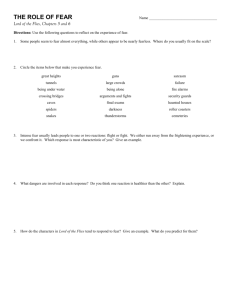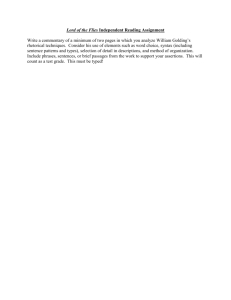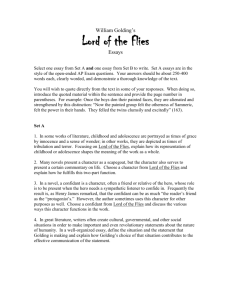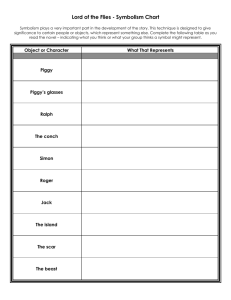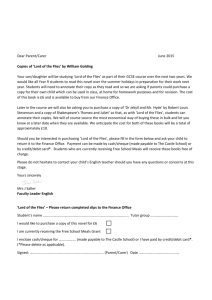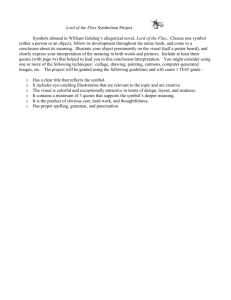473 kB English III Honors and AP Summer Reading 2015
advertisement
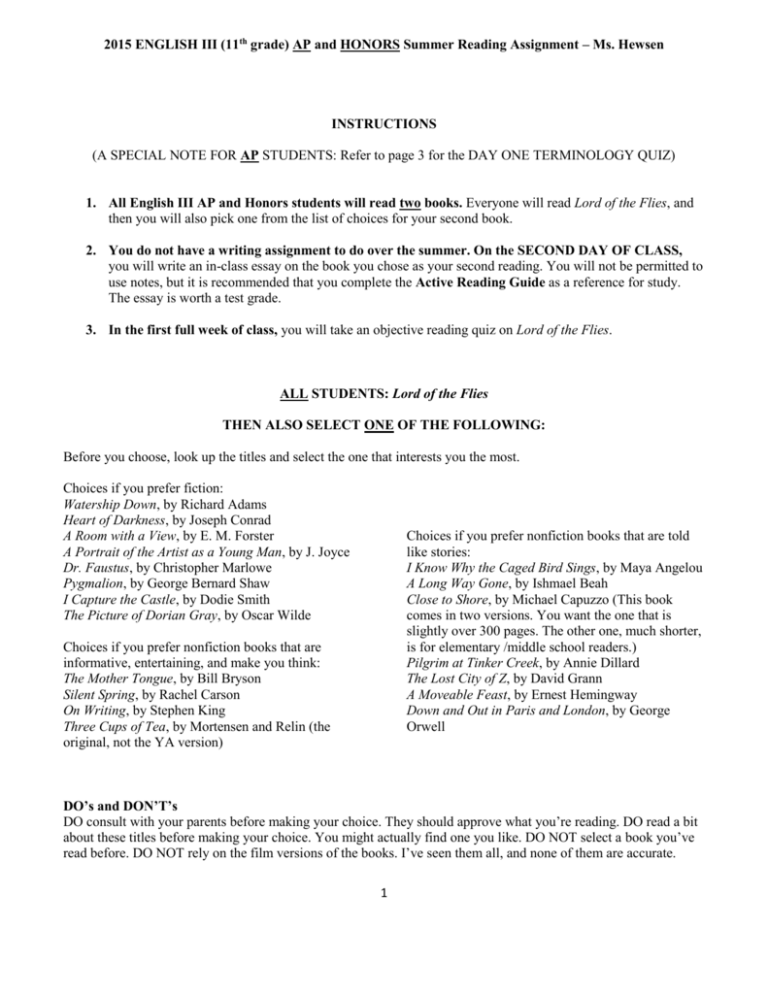
2015 ENGLISH III (11th grade) AP and HONORS Summer Reading Assignment – Ms. Hewsen INSTRUCTIONS (A SPECIAL NOTE FOR AP STUDENTS: Refer to page 3 for the DAY ONE TERMINOLOGY QUIZ) 1. All English III AP and Honors students will read two books. Everyone will read Lord of the Flies, and then you will also pick one from the list of choices for your second book. 2. You do not have a writing assignment to do over the summer. On the SECOND DAY OF CLASS, you will write an in-class essay on the book you chose as your second reading. You will not be permitted to use notes, but it is recommended that you complete the Active Reading Guide as a reference for study. The essay is worth a test grade. 3. In the first full week of class, you will take an objective reading quiz on Lord of the Flies. ALL STUDENTS: Lord of the Flies THEN ALSO SELECT ONE OF THE FOLLOWING: Before you choose, look up the titles and select the one that interests you the most. Choices if you prefer fiction: Watership Down, by Richard Adams Heart of Darkness, by Joseph Conrad A Room with a View, by E. M. Forster A Portrait of the Artist as a Young Man, by J. Joyce Dr. Faustus, by Christopher Marlowe Pygmalion, by George Bernard Shaw I Capture the Castle, by Dodie Smith The Picture of Dorian Gray, by Oscar Wilde Choices if you prefer nonfiction books that are told like stories: I Know Why the Caged Bird Sings, by Maya Angelou A Long Way Gone, by Ishmael Beah Close to Shore, by Michael Capuzzo (This book comes in two versions. You want the one that is slightly over 300 pages. The other one, much shorter, is for elementary /middle school readers.) Pilgrim at Tinker Creek, by Annie Dillard The Lost City of Z, by David Grann A Moveable Feast, by Ernest Hemingway Down and Out in Paris and London, by George Orwell Choices if you prefer nonfiction books that are informative, entertaining, and make you think: The Mother Tongue, by Bill Bryson Silent Spring, by Rachel Carson On Writing, by Stephen King Three Cups of Tea, by Mortensen and Relin (the original, not the YA version) DO’s and DON’T’s DO consult with your parents before making your choice. They should approve what you’re reading. DO read a bit about these titles before making your choice. You might actually find one you like. DO NOT select a book you’ve read before. DO NOT rely on the film versions of the books. I’ve seen them all, and none of them are accurate. 1 ACTIVE READING GUIDE Please have a notebook open while you’re reading. The notes you take will be useful as a study tool when it comes time for a test or essay. 1. List new or difficult vocabulary words. Look up their definitions and write them in your notes. 2. If you chose one of the informative books (Mother Tongue, Silent Spring, On Writing, or Three Cups of Tea), then it’s recommended that you keep a chart of the major points made throughout the book and some important details the author uses to support each point. Example: Major points made by the author Details the author gives to support each point For Lord of the Flies and the rest of the books, complete 3, 4, and 5. 3. Create a chart in which you write details, observations, and descriptions of important characters or individuals approximately 1/3 of the way through, 2/3 of the way through, and at the end of the book. approx. 1/3 of the way approx. 2/3 of the way through the book through the book at the end of the book Character or Individual 4. Create a chart in which you describe the important places (settings) and what happens in each place. detailed description what happens there Place 5. Track the decisions made by the characters throughout the story. You’ll end up with a detailed plot outline and evidence of the various conflicts that occur. A word on using resources like Sparknotes: You might want to refer to a resource while you’re reading. That’s fine. This works well when you’ve read the book and need more information. It’s not an alternative to actually reading the book, however. 2 AP English Language and Composition – Introductory Study Guide FIRST DAY OF SCHOOL – TERMINOLOGY QUIZ “The ability to comprehend complex texts is the most significant factor differentiating college-ready from noncollege ready readers.” – Sandra Alberti in Educational Leadership Eleventh grade AP English Language and Composition is modeled after the kind of composition (writing) course that all college students are required to take during the first semester of their freshman year. We study rhetoric – the many ways authors use language to convey meaning. The major difference you will see between what we read in AP and what your fellow eleventh graders will read in their classes is that we cover more nonfiction- speeches, articles, essays, opinions, memoirs, histories, current events, etc. The following terns serve as an introduction to the concepts covered in AP Language and Composition. Study the terms and be prepared to be tested on them on the first day of school. Essay Writing 1. To analyze a text means to explain how an author uses language to accomplish a purpose, to convey meaning, or to create an effect. 2. To argue means to present a variety of convincing evidence to support a point, take a side, or make a judgment. 3. To synthesize means to use information from multiple informational (research) sources. Rhetorical Appeals 4. Aristotle: the ancient Greek philosopher who defined the concept of rhetorical appeals 5. rhetoric: simply put, rhetoric studies the many ways authors use language to convey meaning 6. appeal: a method of persuasion in writing and speaking 7. logos: an appeal made through logic and reasoning 8. ethos: an appeal made through the credibility (believability) of the writer or speaker 9. pathos: an appeal made to one’s emotions The Basics of Analysis (PACCT) 10. purpose: the reason for writing or speaking 11. audience: the people intended to be reached or impacted by the writing or speaking 12. context: the historical, social, psychological, or emotional “climate” in which the writing or speaking is done 13. claim / assertion: the writer or speaker’s main point or argument 14. tone: attitude or emotion expressed through the writing or speaking Some Commonly Seen Terms of Analysis (there are many more) 15. allusion: a reference to a well-known story, song, work of art, etc. 16. anaphora: repetition at the beginning of sentences 17. anecdote: a brief story used to illustrate a point 18. antithesis: an examination of opposites 19. cumulative: stating the main idea first, followed by supporting evidence 20. diction: an author’s specific word choice 21. juxtaposition: the act of placing ideas “side by side,” so to speak, in order to compare and contrast them 22. metonymy: using a single aspect to refer to a larger idea: i. e., saying “the crown” to refer to royalty 23. parallelism: a similarity in grammatical structure 24. periodic: introducing a set of evidence first, followed by the main idea or point 25. syntax: covers the wide variety of ways to arrange words into phrases, sentences, and paragraphs 3
